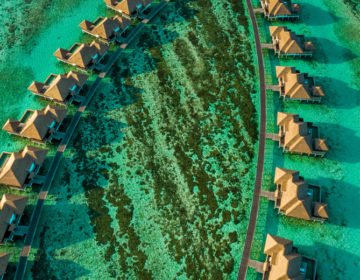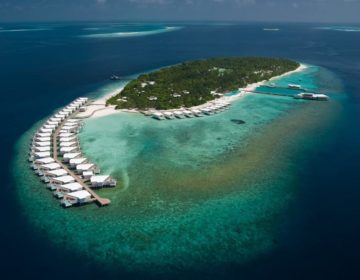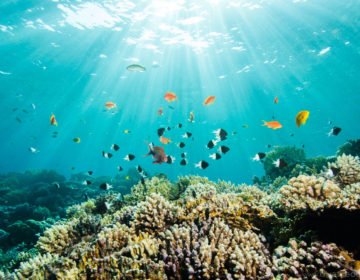The highest cost of holidaying in the Maldives is your accommodation and depends entirely on where you stay and at what time of the year. For most visitors, the cost of lodging and meals will be part of their holiday package, which might also include airfares and transfers, and is generally paid in advance so there should be no surprises on arrival.
But it doesn’t stop there – extras can add significantly to the cost of a Maldives holiday. Drinks will usually cost extra, apart from coffee or tea with meals and juice with breakfast. The price of drinks is generally proportional to the cost of the resort, but not always – some cheaper resorts charge top prices for drinking water. For water, soft drinks and a beer at dinner, allow at least US$10 per day, and if you want wine with your meal, you are looking at an extra US$20-30 depending on the origin. If you’re going to have a serious drinking session with cocktails, it could cost US$50 or more, depending on your capacity and how much you tip.
The other big extra is activities. Diving costs vary with the cost of the resort, but keen divers in a mid-priced resort should allow up to US$400 a week if they have their equipment and up to US$500 if they are renting everything. This based on about US$300 – US$400 for a dive package depending on equipment rental, plus US$20 per dive for the use of the boat. If you’re a keen beginner, allow US$450 – US$600 for an open water diver course. If you are there to dive, you won’t count the cost, and you won’t regret it.
If you won’t be content to bask on the beach, allow US$30 – US$40 per day for windsurfing, night tennis, island hopping excursions or snorkel hire. Buying souvenirs, sunscreen, and sundry items at the resort shop can also add up.
On a safari trip, the costs can be anything from US$80 to US$200 per person per day, with another US$100 or so for diving, but at least there won’t be any extras. Staying in Malé on a budget, you could get by on US$40 a day or even less if you were sharing a room.
Carrying Money
At a resort you don’t need to carry money at all – everything will be billed to your room, and you settle up before you leave, with credit cards or traveler’s cheques. In Malé at the airport and on the islands where tourists visit, foreign cash is generally accepted – US dollars are most common, but British pounds and Euro are acceptable too. You won’t need Maldivian rufiyaaa unless you are using local shops and services. Even these will usually take US dollars, but not at full rate and if you generally don’t get change if you pay in foreign currency, so it’s best to use local money in the local economy.
Credit Cards
Every resort takes American Express, and Visa and nearly all take MasterCard, and a few take Diners or JCB. Make sure your limit is enough for your final bill in US dollars, and the cashier may need some time to check your credit.
International Transfers
Banks in the Maldives are not noted for their efficiency in international transactions. A transfer using the ‘Swift’’ system seems to be the most efficient way to get money to the Maldives. Try to have the money handed over to you in US dollars.
Currency
The unit of money is the rufiyaa (Rf), which is divided into 100 larees. Notes come in denominations of 500, 100, 50, 20, 10 and five and two rufiyaas, but the latter is uncommon. Coins are in denominations of two and one rufiyaas, and 50, 25, and ten laree.

Currency Exchange
Bring a credit card and US dollars traveler’s cheques. Most hotel and travel expenses will be billed in dollars, so there’s no point in incurring extra conversion costs. Some cash in small denomination US dollars is useful for tipping and to change into rufiyaa for use in local shops. There are no restrictions on changing money into rufiyaa, but there is no need to change a lot. Most of your expenses will be in dollars, and there’s no point in getting a considerable amount of rufiyaa which you’ll have to re-convert on departure. Rufiyaa are not readily negotiable outside the country. The exchange rate is displayed at banks, money changers and the cashier’s office at a resort.
Changing Money
Banks in Malé are clustered at the harbor end of Chandani Magu and along Marine Drive (East). They are open Sunday to Thursday from 08h00 to 13h30.
The best places to reconvert excess rufiyaa are at the Monetary Authority on Chandani Magu or at the bank counter at the airport. Officially, you may need receipts to prove that you bought the rufiyaa at the official rate, but you won’t usually be asked to show them. If your flight leaves at night, you find the airport bank is closed.
Most places will change traveler’s cheques into UK pounds, Euros, Japanese yen, and Swiss Francs, but US dollar cheques are the best option and can usually be exchanged for cash dollars. There are some official and unofficial money changers in Malé. They stick rigidly to the official rates and usually only buy US dollars. Many of them will change US dollars traveler’s cheques into US dollars cash with little or no commission.
Tipping
Officially, tipping is discouraged in the Maldives. Unofficially, if the service is excellent, and it usually is, it’s quite customary to tip room staff and waiters in your resort. Restaurant seating is generally organized so you’ll have the same waiter for your entire stay, and US$20 per couple per week is a suitable amount. US$10 per week is also appropriate for the person who cleans your room. A few resorts add a 10% service charge to your bill, in which case you don’t need to tip. Sometimes, 10% is only added to the bar bill, but if not, the bar staff can be tipped as well. If you go on a boat trip, especially for diving, it’s usual to tip the crew US$5. Give any tips to the staff personally, not to the hotel cashier – US$ or local currency are equally acceptable. Resort staff are not very well paid and are usually employed on contracts which take them away from their home islands for many months at a time – a little extra from tip can make a big difference for their families at home.
In Malé, the fancier restaurants usually add a 10% service charge, so you don’t need to tip, and tipping is not customary in local tea shops. Taxi drivers are not tipped, but porters at the airport expect Rf10 or US$1.

Bargaining
Bargaining is limited to tourist shops in and around the Singapore Bazaar in Malé and at island village souvenir shops where prices are not fixed. Most tourists come on brief shopping excursions from the resorts, and some traders will ask what they feel they can get away with.




[…] If you want to know more about money in the Maldives then check out this detailed article. […]